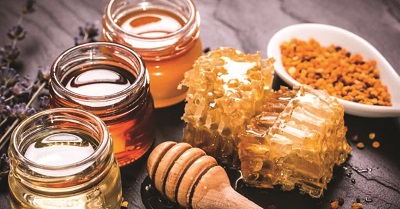By Moipone Letsosa MASERU –
Bee faming has become extensively popular of late and comes with a multitude of benefits attached to it. Ts’eliso Mofubelu, 39-year-old founder of Mokhethi Honey Farm, cautiously named after his late father Ntate Mokhethi Mofubelu elaborates more on what it takes to become a bee farmer.
Mokhethi Honey Farm – now a commercial business, was founded in 2021 at Teyateyang (TY), Ha Mohlaetoa in the district of Berea. Its sole mandate is to service the demand for organic honey, propolis, wax, royal jelly and bee venom. Professionally an accountant, Mokhethi left the corporate world in 2015 to pursue his crop farming expedition. Initially beekeeping was merely to fast track pollination of crops for the purpose of higher yield but now bees do so much more, through the help of research and innovation bees can be used to cure people with their therapeutic characteristics. He helps arthritis patients by giving them bee venom therapy.
In TY the honey yield is high due to the quickened pollination processes aided by bees. He clarified that besides honey and other hive products, the honey bee existence contributes directly to food security through pollination, one third of the worlds food production depends on bees.
He explained that raw honey improves digestion, can cure acne and improve circulation. Raw honey can help lower cholesterol, promotes restorative sleep and is also an antioxidant. Raw honey can improve diabetes, hay fever symptoms, relieves burns, lessens diarrhea, eases athlete’s foot and helps with the effects of headaches moreover helps treat bronchial asthma.
He further explained there is a beeswax that is ideal for furniture polish, it creates smooth runs for doors and windows and is used for ear candling. Beeswax is used for encaustic paintings, it is used to coat reeds on woodwind instruments also used on bullets. He said beeswax is also used to coat nails and polishes granite tops.
From his distinct location he believes he has a competitive advantage of producing the best organic honey over his fellow competitors. He is surrounded by a vast species of flowers and vegetation which the bees feed on. Mr. Ts’eliso mentioned that the biggest challenge is climate change as sometimes there is a lot of wind (storms) and a lot of rain. “Now the next step is to make a structure like a beehive where the bees can be protected from the heavy rains and winds”, he said.
When one sees a beekeeper first thing that pops up in mind is their protective gear, the same gear that was heavily utilized when disinfecting the city during the devastating times of covid19 outbreak. This is a vivid imagine of the danger of bees to unprotected people, one needs the exact suites that are used for the outbreak of airborne diseases because bees can actually kill a person, so getting access to the gear is not so easy. Another challenge is that of finding boxes and materials in general but for now he is raising beehives.
He indicated that the demand for raw honey is very high amongst the community more especially during the cold months of winter, but once he had up scaled his production he will be supplying pharmaceutical companies and retail stores. He also expressed interest in tapping in the exportation of honey as the market is completely untapped which makes him wonder why because most Lesotho products have an advantage of geographical identity opportunities around the globe. He concluded by saying as much as the challenges arise in business the aim is to persevere and overcome.
Honey is a natural sweetener that is used as an anti-flammatory, antioxidant and antibacterial agent. Propolis is a resin that bees create. It contains a mixture of bee saliva, beeswax and substances from plants and trees. It may have some health benefits for humans. It contains polyphenols, such as flavonoids which is a type of antioxidant. Some substances in propolis may also have anti-cancer properties.


